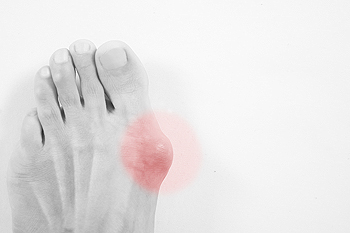
A bunion is a bony bump that forms at the base of the big toe, caused by a misalignment of the toe joint. As the big toe moves inward, the joint sticks out, causing pain, redness, and swelling. Symptoms of bunions can range from mild discomfort to severe pain, making it difficult to wear certain shoes or walk for long periods. In some cases, bunions may also cause corns or calluses to form on the toes. The primary causes of bunions include wearing tight or ill-fitting shoes, genetics, and certain medical conditions like arthritis. To prevent bunions, it is important to wear shoes that provide enough room for the toes, particularly shoes with a wide toe box. Regular foot exercises to strengthen and stretch the muscles in the feet can also help reduce the risk of developing bunions. If you have a bunion, it is suggested that you consult a podiatrist who can monitor its development, and offer effective relief tips.
If you are suffering from bunion pain, contact one of our podiatrists of ABC Podiatry. Our doctors can provide the care you need to keep you pain-free and on your feet.
What Is a Bunion?
Bunions are painful bony bumps that usually develop on the inside of the foot at the joint of the big toe. As the deformity increases over time, it may become painful to walk and wear shoes. Women are more likely to exacerbate existing bunions since they often wear tight, narrow shoes that shift their toes together. Bunion pain can be relieved by wearing wider shoes with enough room for the toes.
Causes
- Genetics – some people inherit feet that are more prone to bunion development
- Inflammatory Conditions - rheumatoid arthritis and polio may cause bunion development
Symptoms
- Redness and inflammation
- Pain and tenderness
- Callus or corns on the bump
- Restricted motion in the big toe
In order to diagnose your bunion, your podiatrist may ask about your medical history, symptoms, and general health. Your doctor might also order an x-ray to take a closer look at your feet. Nonsurgical treatment options include orthotics, padding, icing, changes in footwear, and medication. If nonsurgical treatments don’t alleviate your bunion pain, surgery may be necessary.
If you have any questions, please feel free to contact our office located in Columbus, OH . We offer the newest diagnostic and treatment technologies for all your foot care needs.




